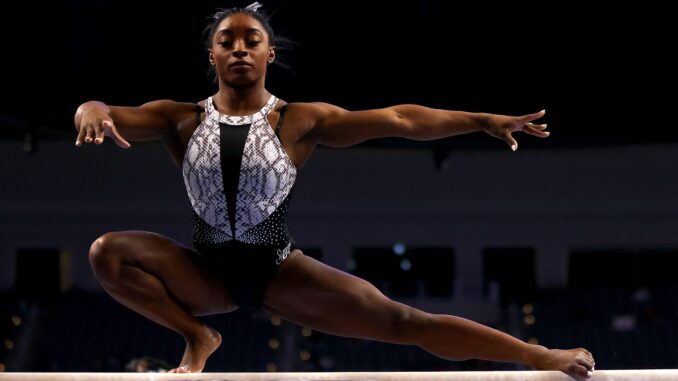
Stephen A. Smith has inserted himself directly in the middle of the discourse involving Simone Biles, former collegiate swimmer Riley Gaines and the inclusion of trans athletes in sports.
Biles, 28, and Gaines, 25, engaged in a back-and-forth via X on Friday, June 6, centered around the rights of trans athletes, during which Gaines equated trans inclusivity to the abuse of former Team USA gymnastics doctor, Larry Nassar. “Respectfully, Gaines I was with you until that last quote,” Smith, 57, said Monday, June 9, on his podcast, “The Stephen A. Smith Show.” “Respectfully, that’s going a bit too far. Talking about transgender women competing in sports in one issue. Using a guy like Larry Nassar — one of the most despicable human beings we’ve ever witnessed on this Earth who molested and abused numerous women, numerous gymnasts, including Biles — to go that low, Gaines you lost all credibility.”
Smith continued, “You could have made your argument without going that far. No matter what Simone Biles said to you, how she may disagree with you on your position, did not warrant you to go that far. Certainly you’re not suggesting that it was okay for her to be molested. Certainly you’re not suggesting it was okay for her to be abused. So why would you say something like that? It’s just cruel.”
Simone Biles Hilariously Calls Out Kylie Jenner For Beyond Oversized Khy Blazer: ‘A Crime’. Us Weekly has reached out to Gaines for comment. “The reality is that it is a disservice to women in a lot of people’s eyes that men transitioning to women get to compete in women’s sports,” Smith argued.
He added, “There’s an abundance of women out there who have a right to feel the way that Riley Gaines feels, Simone Biles. Now whether it’s right for me or somebody else to say, it’s a different argument.” Gaines, a former swimmer at the University of Kentucky, has become a staunch advocate for keeping trans women out of sports after competing in 2022 against Lia Thomas, the first openly trans woman champion in the NCAA women’s division.
The social media debate between Gaines and Biles started when Gaines alleged a Minnesota high school softball team won the state championship because their “star player is a boy.”
When Sports Collide With Culture Wars
In today’s hyper-connected world, it doesn’t take long for a conversation to spark a wildfire. That’s exactly what happened when Simone Biles and Riley Gaines made headlines with their opposing stances on athlete recognition and gender roles in sports. But now, a new voice has stormed the arena—Stephen A. Smith, the fiery ESPN commentator known for speaking his mind with unapologetic intensity.
So, what happens when sports, politics, and identity collide under the bright lights of public opinion?
Let’s break it all down.
Who’s Involved?
Simone Biles: The GOAT of Gymnastics
Simone Biles isn’t just an athlete—she’s a phenomenon. With multiple Olympic gold medals and a reputation as one of the greatest gymnasts in history, she represents more than just skill. She embodies empowerment, mental health advocacy, and trailblazing excellence.
Riley Gaines: The Activist Swimmer
Former NCAA swimmer Riley Gaines has gained notoriety in recent years for her vocal stance on fairness in women’s sports, particularly when it comes to the inclusion of transgender athletes. She’s bold, outspoken, and not afraid to stir the pot.
Stephen A. Smith: The Voice That Roars
Smith is no stranger to controversy. Known for his passionate takes on sports and culture, he recently joined the discourse, and—let’s just say—things got real, fast.
What Did Stephen A. Smith Actually Say?
During a heated segment on his podcast and later on ESPN’s “First Take,” Stephen A. Smith tackled the growing divide between Biles and Gaines, saying:
“We’ve got two women standing for something they believe in. But the problem is—we’re ignoring the larger picture: Respect.”
That one word—respect—became the crux of his argument. Smith emphasized that whether you agree with Biles or Gaines, both deserve to be heard without being discredited.
Why Did He Step In Now?
Timing is everything, and Smith’s commentary came just after social media exploded with backlash against Simone Biles for receiving the Presidential Medal of Freedom, with critics like Gaines calling it “political pandering.”
Smith saw the storm brewing—and jumped right into the eye of it.
The Crux of the Controversy
Simone Biles and Presidential Recognition
Many applauded the White House’s decision to honor Biles, not just for her Olympic feats, but for her mental health advocacy. But not everyone agreed—including Riley Gaines.
Riley Gaines’ Perspective
Gaines argued that such awards should be reserved for those who fight for fairness in sports. She positioned herself as a protector of women’s rights in athletics, often pointing fingers at what she calls “performative activism.”
Stephen A. Smith’s Take: Boom or Bust?
Smith didn’t just analyze the situation—he challenged the audience to think deeper.
“Stop Choosing Sides Based on Agendas”
He called out both conservative and liberal media for twisting narratives to fit their audiences, urging fans to focus on the merits of each athlete’s contribution instead of dragging them through partisan mud.
Did Smith Defend Simone or Support Gaines?
Here’s where things get interesting.
He didn’t pick a side. Instead, Smith walked a tightrope—recognizing Biles’ achievements while acknowledging Gaines’ concerns. His message? “This isn’t about who’s right—it’s about listening.”
Public Reaction: A Nation Divided
Team Biles
Fans rushed to defend Biles, calling her a symbol of resilience and female empowerment.
Team Gaines
On the other side, Gaines’ supporters praised her courage for speaking on issues others fear to touch—especially regarding transgender athletes in women’s sports.
And Then There’s Smith’s Army
Many praised Stephen A. for injecting rationality into a polarizing debate. Others called him out for “playing both sides.”
The Bigger Picture: Sports as a Mirror of Society
This debate isn’t just about awards or athletic titles—it’s a reflection of societal tension.
Are we rewarding athletes for who they are, or what they represent? And is there space in public discourse for nuance, or are we doomed to pick sides?
Why This Story Matters
Sports aren’t just games anymore—they’re battlegrounds for culture, identity, politics, and values. When someone like Stephen A. Smith jumps in, it signals that the debate has transcended ESPN panels and entered national consciousness.
How Should We Navigate These Disputes?
Instead of echo chambers, we need conversations. We need more voices that seek understanding rather than division. Stephen A.’s message, though imperfect, reminded us that listening is a radical act.

Final Thoughts: What Can We Learn From This?
Stephen A. Smith’s entry into the Simone Biles vs. Riley Gaines saga didn’t provide a clean answer—but maybe that’s the point.
In a world hungry for sides, taking a stand for dialogue over division might be the boldest move of all.
Conclusion: Let’s Talk, Not Tear Down
Simone Biles stands as a symbol of strength, grace, and vulnerability. Riley Gaines represents the fierce push for what she believes is fairness in sports. And now Stephen A. Smith reminds us that not everything has to be a shouting match.
Maybe, just maybe, the real win here is learning how to disagree—respectfully.
